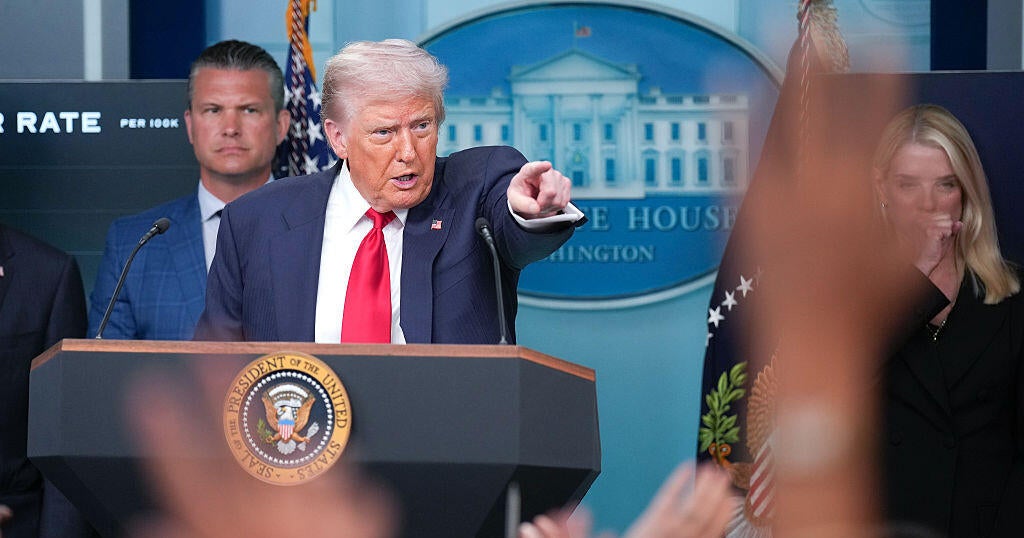Trump freezes $200 million in funds earmarked for Syria recovery
President Trump's administration has frozen $200 million earmarked for Syria recovery efforts, CBS News' Margaret Brennan and Kylie Atwood confirmed. The development comes after Mr. Trump said this week the U.S. will be pulling out of Syria "very soon."
Atwood reports the decision was relayed to the State Department Friday in a call that White House chief of staff John Kelly made to Deputy Secretary of State John Sullivan. There is some recovery funding that will continue for the next few weeks, but all future money is on hold.
The money -- to have been spent by the State Department for infrastructure projects like power, water and roads -- had been announced by fired Secretary of State Rex Tillerson at an aid conference last month in Kuwait.
The State Department has been asked to provide the White House with more information on the Syria recovery funding, Atwood reports -- such as specific projects to be laid out. Mr. Trump wants other countries to step up to the plate, and do and pay more. The freeze does not impact Department of Defense operations.
Brennan reports the president has it in his mind that he wants to get out of Syria, but also told Turkish President Recep Tayyip Erdogan on Friday that the U.S. is not done fighting the Islamic State of Iraq and Syria (ISIS). In short, Brennan reports, the president's remarks -- and this freeze -- contradict policy that had been in place under Tillerson.
Meanwhile, U.S. Central Command and the State Department are scheduled to host an event Tuesday about rebuilding Syria and Iraq after ISIS. Secretary of Defense James Mattis, Brennan reports, has been consistent that the military needs to gradually, and not suddenly, hand matters off to diplomats. Mr. Trump's pivot also makes the fate of Syrian president Bashar al Assad unclear.
Mr. Trump described his intent to get out of Syria in a speech to union workers Thursday in Ohio -- a speech that was billed as an infrastructure plan pitch.
"Things are changing, folks," Mr. Trump told the crowd. "But now is the time to rebuild our country, to take care of our people, and to fight for our great American workers for a change. ... We'll be coming out of Syria, like, very soon. Let the other people take care of it now. Very soon. Very soon, we're coming out. We're going to have 100 percent of the caliphate, as they call it -- sometimes referred to as 'land.' We're taking it all back quickly. Quickly. But we're going to be coming out of there real soon. We're going to get back to our country, where we belong, where we want to be."
Mr. Trump's unscripted remark about pulling out of Syria "very soon," while at odds with his own policy, was not a one-off: For weeks, top advisers have been fretting about an overly hasty withdrawal as the president has increasingly told them privately he wants out, U.S. officials told the Associated Press.
Only two months ago, Mr. Trump's aides thought they'd persuaded him that the U.S. needed to keep its presence in Syria open-ended — not only because ISIS has yet to be entirely defeated, but also because the resulting power vacuum could be filled by other extremist groups or by Iran.
Mr. Trump signed off on major speech in January in which Tillerson laid out the new strategy and declared "it is vital for the United States to remain engaged in Syria." But by mid-February, Mr. Trump was telling his top aides in meetings that as soon as victory can be declared against ISIS, he wanted American troops out of Syria, said the officials. Alarm bells went off at the State Department and the Pentagon, where officials have been planning for a gradual, methodical shift from a military-led operation to a diplomatic mission to start rebuilding basic infrastructure like roads and sewers in the war-wracked country.
Mr. Trump's first public suggestion he was itching to pull out came in a news conference with visiting Australian Prime Minister Alastair Campbell on Feb. 23, when Mr. Trump said the U.S. was in Syria to "get rid of ISIS and go home."





